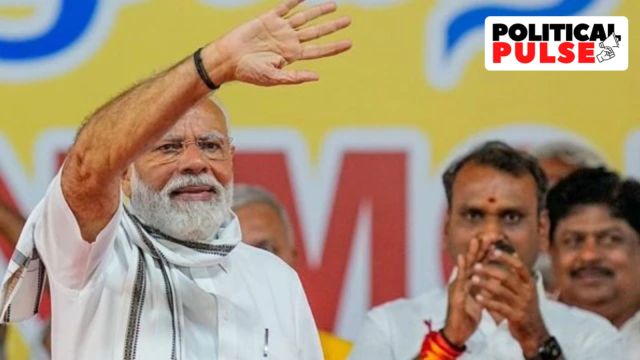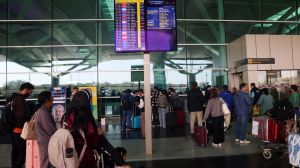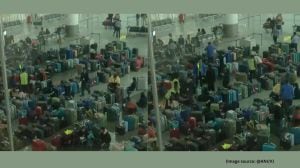At the heart of the North-South politics playing out most intensely in Tamil Nadu – all 39 Lok Sabha constituencies there go to polls Friday – is what can be described as twin trust deficits issue: one relates to ‘financial resources’ and other to ‘political representation’.
While the fight over resources has taken political wings during the campaign, that over representation manifests itself in ways unique to Dravidian political history – Tamil pride and culture and opposition to Hindi, a centralised governance model, and the politics of polarisation based on faith.

The BJP did not ally with either of the two Dravidian parties, DMK or the AIADMK, and is pushing hard to increase its vote share in the state. It hopes to bag at least four Lok Sabha constituencies – Vellore, Coimbatore, Tirunelveli and Kanyakumari – in the state which it considers the last frontier in the south to get a foothold.
The complaints and allegations regarding financial resources are different for each southern state though. For Tamil Nadu, they are delayed or inadequate relief support for natural disasters, Centre playing politics on infrastructure projects, and unfair deal in the sharing of resources; for Karnataka, it’s about lower devolution of Central funds, non-payment of GST compensation; and for Kerala, it is about the Union government curbing borrowings by state undertakings.
Some of these complaints have escalated to court battles between the states and the Union government, and have also been finding an echo in the states – from speeches in the Assembly to political rallies and public addresses by state leaders of Congress, DMK and the Left governments in the states.
The real representation question kicks in only two years later subject to the next government’s decision on the delimitation exercise that will substantively expand the Lok Sabha strength based on demographic changes in the states.
The likelihood that southern states will have a relatively lesser voice compared with Uttar Pradesh and Bihar post delimitation certainly doesn’t ring a bell among voters in Tamil Nadu, political parties though are acutely conscious. This resentment finds expression in complaints that southern states are being meted out unjust treatment.
Story continues below this ad
At times, it goes overboard, and the party then fumbles to undo the damage. For instance, Udhayanidhi Stalin, son of Chief Minister MK Stalin and himself the Youth Welfare and Sports Development Minister, recently equated ‘Sanatana Dharma’ with Covid and dengue, and called for its eradication. “This is immature and was best avoided,” said a senior DMK leader, who did not wish to be named. But Udhayanidhi’s position and stature in the party is such that his statements had to be defended by many. “There was a needless scramble,” the leader said.
There’s an essential difference between the Periyar-founded Dravidar Kazhagam (DK) and Dravida Munnetra Kazhagam (DMK) founded by CN Annadurai, former Chief Minister of Tamil Nadu. “DK expects people to be atheist, DMK doesn’t… some founding members happened to be atheist,” says AS Panneerselvan, Fellow, Centre for Study in Public Sphere, Roja Muthiah Research Library, in Chennai.
At least two DMK politicians, IT Minister P Thiaga Rajan and Hindu Religious and Charitable Endowments Minister PK Sekar Babu, openly flaunt their religiosity. “Nobody looks at them as non-Dravidians… Both are articulate, and open about faith,” Panneerselvan pointed out.
It is in religiosity and Tamil culture again where Prime Minister Narendra Modi also jostles to find space. The courting of adheenam (Shaivite sect) is not lost on the Tamil Brahmins and its religious leaders. “Custodians of the philosophical and theological literature on the Savia Siddhanta, the various adheenams in Tamil Nadu are non-Brahmin sects,” a religious Brahmin leader, who did not wish to be named, said. “The ordering of a sengol from the adheenam, giving it importance in Parliament, are all attempts to reach out to the religious non-Brahmin Tamil population in the state,” the leader noted.
Story continues below this ad
But Modi is adding elements to BJP’s appeal. “The Kashi Tamil Sangamam is an effort to rediscover the cultural links between Kashi in Uttar Pradesh and Tamil Nadu,” explained a BJP leader, adding it also serves to bring north Indians closer to the Tamil people, and reduce the coarse opposition to Hindi.
“Even as the BJP goes about this project, in his public rallies Modi first seeks forgiveness for his inability to address the people in Tamil… And says BJP has promised to promote Tamil’s global recognition, and vouches for his love of the Tamil language and culture,” the leader said.
The DMK, however, presents a strong pushback, and given its presence in the grassroots, in every village and every panchayat, the fight for BJP is not easy. “It’s also an ideological battle — between centralisation and decentralised politics. DMK’s leadership is located here, decisions are taken here…,” said Panneerselvan.
An academician, who did not wish to be named, also said that ideas like ‘one nation, one election, one language or one religion’, are resented by people in Tamil Nadu. “You cannot be seen as insensitive to the economic and cultural sensitivities of the non-Hindi speaker,” said the academician, who worked with the University of Madras.

































